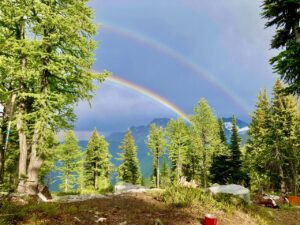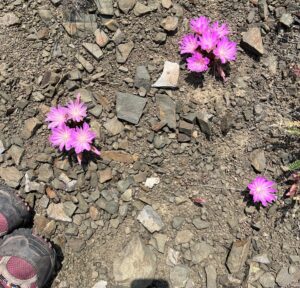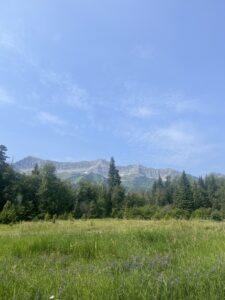A Continuous Journey
by Fiona Medieros
Just like Conservation Across Boundaries as a course, gratitude truly does have roots in the experiential.
The past six weeks of exploring the Crown of the Continent with WRFI have truly been like no other I’ve experienced. I am so incredibly fortunate to have been guided with my peers in exploring such a grand landscape full of mountains, rivers, and wildflowers. To gently tread through the homes of creatures, from the teeniest insects to big brawny carnivores, has been a privilege and a gift.
A continuous journey I’ve been on for quite a while now, one that has been profoundly supported by my time on this course, is one that’s difficult to articulate, though I’m eager to try. We each have a certain power, or rather, a space in our consciousness, that most of us seldom tap into amid the business of life and its many demands. It’s a beautiful place that exists within each of us, that is unwaveringly able to seek and find meaning, stories, lessons, values, and connection. It costs not a single cent to access, nor a single lifted hand, but rather, a mere moment’s pause, a deep breath, and perhaps a bit of intention to open the doors to this room in your mind.

Gratitude, the idea of appreciative mindfulness, is quite the force to be reckoned with. To practice gratitude requires presence, or the ability to aim and submit oneself to Here and Now. From this trip I have found that it’s quite easy to feel grateful when you’re surrounded by babbling creeks and a gentle breeze, or during moments in which your only job is to gaze out over the Rocky Mountains. In such times, which we experienced within the sanctity of our backcountry camping spots, engulfed in curiosity and awe, gratitude tended to find us first in the form of sheer beauty.
The practice becomes more challenging, however, in times of deep discomfort and frustration—perhaps amidst a swarm of biting insects or a bout of dehydration. During difficult times of any caliber, but more specifically in our backcountry circumstances, gratitude is paramount a practice, as much for the sake of others as ourselves. To keep us grounded, to feed our grit, to remind us of all the good out there when it’s hard to get in touch with. While we were trail-lessly traversing down Jumbo pass, through moss-coated booby traps and mosquito breeding grounds beneath the scorching sun, group morale was undoubtedly low. In just a few moments of focus and gratitude for my two strong legs, all the love waiting for me at home, and Eva’s generous dose of Stinger honey, the forest service road that awaited us down the moraine became not the sweet release from bushwhacking, but yet another piece of the beautiful puzzle of terrain we were so lucky to experience that day. And when we finally did make it to that service road, the palpable joy of the group transformed into a memory of a time and a trip I am so happy to have known. And now, more broadly speaking, I am feeling much more patient and at peace with life’s inevitable obstacles and darknesses, as there is always light to be found, regardless of where we are, whether in something fantastical or simply the Earth holding onto the bottoms of our feet.

Just like Conservation Across Boundaries as a course, gratitude truly does have roots in the experiential. It fits everywhere, and in the day-to-day dynamism of it all, I argue for its immense power—much greater than we know—to dictate, or at least influence the nature of our experiences, both big and small. Even when learning about heavy topics like genocide and environmental degradation, I am so proud of our class for recognizing the value in such hard lessons, and for how we’ll take our knowledge back home and into our own communities. In conservation work, gratitude is of utmost importance as an avenue for recognizing the value in the precious impermanence of our planet and its creatures. To acknowledge and appreciate what lives and what once lived amongst humans, as well as all of the perspectives and experiences that take part in our existence, is crucial to this work and its innate interconnected nature.
In an effort to practice what I preach, I’d like to take a mindful moment, if you don’t mind. ☺

I find myself under a juniper, casting a shadow of shady refuge for my classmates writing their final papers. It’s 97 degrees out, and we can see a wildfire plume in the distance but feel safe, together under this tree, which demonstrates an inspiring and impressive toughness in this heat. My tentmates are beside me hard at work, and I smile thinking of the laughs and stories we’ll share later under the stars. Behind us meanders the lower Flathead River, which has been both our vehicle and lifesource this week—feeding, hydrating, and continuously cooling us. Dinner tonight is stir fry, comprised of the last of our freshies (vegetables), which I’m sure will taste phenomenal whilst satiating our paddle-fueled hunger.
I acknowledge that I am so lucky to be right here, right now. Thank you, to WRFI, my classmates, and my instructors, for this opportunity to further connect with the present. As Robin Wall Kimmmerer says in her piece, Returning the Gift, “Practicing contentment is but a radical act in a consumption-driven society.” An act that I, and I hope you too, will work to keenly pursue as long as the Earth keeps turning.
Thank you for reading!